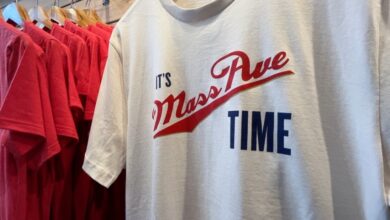Was the Black-owned Hazel’s Blue Lagoon treated the same as a rival nightclub in Amherst?

AMHERST — Two nightclubs opened during the pandemic down the street from each other in this college town.
Several years later, one is thriving. The other, Hazel’s Blue Lagoon, closed.
The survivor, The Drake, offers a crowded and occasionally sold-out series of musical events.
Junior Williams and nephew Patrick Chapman, co-owners of Hazel’s Blue Lagoon, said they, too, had dreams of being a part of the cultural fabric of downtown, but struggled to get their nightclub off the ground.
Was the playing field a level one?
Williams alleges the town of Amherst used discriminatory practices during the licensing and permitting process and when it distributed federal pandemic relief funding.
The Drake got money. Hazel’s Blue Lagoon did not.
The town’s Human Rights Commission and Department of Diversity, Equity and Inclusion conducted an investigation into whether one business was favored over another. Pamela Nolan Young, who oversees those offices, said in a report last year that actions by town employees and by the Business Improvement District were “not discriminatory.”
And yet she called in her report for Amherst to take steps to help ensure that all would-be members of the business community get the help they need from the town when applying for permits.
This story details the complaints that came forward, alleging bias in favor of The Drake and against Hazel’s. It describes the experiences of the two businesses as each moved to open an entertainment destination.
In March, months after Nolan Young’s report, the Black Business Association of Amherst Area called for another investigation into how the town is distributing the remainder of its federal pandemic relief funding.
The group says the town ignored its cry for assistance. Town officials say they administered a fair process that prioritized marginalized BIPOC (Black, Indigenous, people of color) and women-owned businesses.
Hazel’s Blue Lagoon
Williams, the co-owner of Hazel’s Blue Lagoon, moved to Springfield from Jamaica at 11 years old. Hazel Smith, William’s mother, inspired him to cook and open a restaurant.
After looking at potential locations, Chapman said he and Williams decided to open at the former Lit Nightclub and Moti Restaurant. They selected the basement space on 41 Boltwood Walk, managed by Amherst’s Lincoln Real Estate, over a top-floor spot at 44 North Pleasant Street, which belongs to local real estate magnate Barry Roberts.
An advertisement from Lincoln Real Estate depicts the venue as a vibrant nightclub frequented by thousands of University of Massachusetts Amherst students. The space had become available for only the second time in about 12 years.
In 2021, Hazel’s Blue Lagoon signed a lease and opened a Caribbean-American restaurant on one side and what was supposed to be a humming nightclub on the other.
Williams and Chapman say that despite signing a lease, they were unable to fully open until 2022. They claim the licensing and permitting process was riddled with difficulty and delays.
The Drake
“The heartbeat of downtown,” as it bills itself, The Drake opened in April 2022 at 44 North Pleasant St. in a 17,500-square-foot building that was formerly a bank.
The performance venue with a stage seats up to 200 folding chairs and can host up to 240, including standing guests.
Within the first year of its opening, The Drake reported hosting over 200 nights of live performances, showcasing over 1,000 performers and entertaining 25,000 guests. Additionally, The Drake held 12 community events, 10 open mic nights and 53 free events.
An economic impact study for The Drake estimated the venue brought in $375,000 in revenue to local restaurants and retail establishments with 70% of patrons from outside of the Amherst area.
Trouble getting a permit
The owners of Hazel’s Blue Lagoon hit their first obstacle, Williams said, when he applied for a business permit. He found some of the questioning intrusive. “I was asked where I got financial backing from ‘to make sure it came from the right place,’ it was insulting and racist,” he said.
Then, in the process of applying for a liquor license, Williams said he hand-delivered relevant Criminal Offender Record Information materials from the Police Department. That was not enough, town officials told him. An actual Criminal Offender Record Information (CORI) report would be required instead.
Williams said he was asked several times for his immigration status and to resubmit sensitive paperwork, like copies of his passport, after he said he was told by officials that the paperwork had been lost.
In addition to health and plumbing inspectors, an electrician made about six visits before Hazel’s Blue Lagoon finally passed inspection.
Williams said his attempt to open was complicated by what he views as a failure by town officials to delineate all necessary issues at the outset. That led to long delays, which resulted in a loss of revenue. Williams and Chapman say they struggled to piece together the money needed to pay for repairs and cover operational costs.
In her report, Nolan Young issued a recommendation that backs up Williams’ call for greater support for startup businesses.
She recommended that the permitting process “be explained for businesses seeking to start a business in Amherst. … When possible, the initial meeting to discuss necessary compliance for electrical, plumbing, health and gas codes be conducted with all inspectors so that prospective business establishments have a complete picture of the scope of work needed ….”
The owners of The Drake, by comparison, reported a smooth license and permitting experience without delays which they said was facilitated by the professionalism of tradespeople. The town issued The Drake a certificate to operate in April 2022.
Building official’s stance
Amherst Building Commissioner Robert Morra said he and other inspectors worked hard to assist Williams during the permit and license process. He said plans prepared for Hazel’s Blue Lagoon lacked a level of specificity that typically would have been handled by a general contractor.
According to Morra, Williams did not use the town’s online permit application portal. That website enables applicants to submit documents, send receipts, and receive emails regarding steps they need to take.
“A general contractor would use the system to communicate with the inspectors and to provide needed documentation and updates,” Morra said.
Williams ultimately engaged a general contractor for the Hazel’s Blue Lagoon work. However, not all tasks were assigned to this contractor. Some of the work, which the town’s building code stipulates must be done by a licensed general contractor, was carried out by unlicensed contractors, Morra said.
In an interview with The Republican, Morra said he understands why Williams and Chapman were frustrated juggling both hats — that of a business owner and a general contractor — and in his 24 years of being a commissioner that is common.
Access ramp problems
Both Hazel’s and The Drake had their initially proposed Americans with Disabilities Act-compliant ramps rejected.
Williams and Chapman, who believe they were treated differently, said Morra mandated a permanent access ramp at Hazel’s Blue Lagoon before its dance floor could be open.
In the end, the town’s investigation into possible bias found that differences between the venues spurred different requirements for ramps.
And yet The Drake’s ramp was found not to meet proper standards for a commercial use by a state inspector more than a year after the venue opened.
Morra saw and inspected both buildings: Hazel’s Blue Lagoon, which is a nightclub and restaurant, and The Drake, which is described as a nightclub and music venue.
Originally, the ramp at Hazel’s was rejected because work performed was not done by the licensed contractor, as required by the building code, and had not been properly constructed as required by the state Architectural Access Board standards, Morra said.
The initial ramp at The Drake was also rejected, because it did not meet standards for a commercial use.
While the work was being completed, Hazel’s was granted several temporary certificates of occupancy to open, Morra said.
The construction of Hazel’s ramp took about five months and cost over $20,000, William said.
Morra cited distinctions between the uses of the ramps in the two spaces. At Hazel’s, the ramp is used to access space open to the public and sometimes used as a VIP area.
At The Drake, not all events include use of the stage by the general public. Morra said in that case, removal of a temporary ramp does not create a code violation. The Drake received approval to open with a temporary ramp.
Original complaint
It was a town resident who first raised questions about possible bias in the different treatments of the need for ramps.
In February 2023, Vira Douangmany Cage filed a complaint with the town’s Department of Diversity, Equity and Inclusion and Human Rights Commission.
Douangmany Cage accused Morra, Town Manager Paul Bockelman, and Gabrielle Gould, the former executive director of the Amherst Business Improvement District, of discriminatory practices. Her complaint claims they overlooked building codes to permit the opening of The Drake, while not extending the same leniency to Hazel’s.
The Republican contacted Gould by phone. She said that she had “no further comments on the matter, as the situation has been dragged through the mud for over a year.” Bockelman did not respond to The Republican’s multiple requests for comment.
Morra said he showed no favoritism in the permitting process and denied any wrongdoing due to race or color.
During the discrimination investigation led by Nolan Young, Jeff Dougan, assistant director for community services at the Massachusetts Office on Disability, visited both The Drake and Hazel’s Blue Lagoon on March 28, 2023.
During that visit, Dougan said The Drake should have had a permanent ramp with an appropriate handrail.
Dougan also observed that the installation of the permanent ramp at Hazel’s resulted in a loss of space, as at The Drake.
Dougan said the loss of space is why The Drake opted for a portable ramp, rather than a permanent one. Williams told Dougan if he had known of the option to build a portable ramp, as at The Drake, he would have.
Douangmany Cage filed another complaint in April 2023 with Andrew Chase, compliance officer at the state Division of Occupational Licensure. She alleged that The Drake was approved with a temporary ramp, despite issues with the state code.
A variance for The Drake’s ramp was then filed on June 6, 2023, with the Division of Occupational Licensure, after the venue was issued a first violation for failure to provide access to the performing area on May 3, 2023.
The Drake had been open for 13 months.
The May 3 violation warned Roberts, the building owner, and operators of The Drake about possible fines and legal action if they did not take steps to comply with the state regulations or request a variance.
According to the variance, The Drake indicated that the building underwent a gut rehabilitation, and the newly built stage is not a public space, except on certain occasions.
Consequently, Gould informed investigators that The Drake opted for a temporary ramp, which would be made available to performers upon request. The variance argued that building a permanent ramp would result in the loss of space – and reduced ticket sales.
In the course of her discrimination investigation, Morra told Noland Young that plans for The Drake were detailed and included building description, scope of work, classifications and an additional 40 references to code and building requirements.
Morra said he did not recommend the variance process because it is used for modification or substitution which he does not believe was needed in this situation.
The ramp that was finally approved by Morra for The Drake is a commercial grade, custom-designed modular portable ramp which also meets the building code.
During a public hearing on June 13, 2023, with the town’s Disability Access Advisory Committee, the committee voted in favor of the variance, Nolan Young reported in the variance application.
The Division of Occupational Licensure Office of Public Safety and Architectural Access Board reviewed and granted the variance on July 24, 2023.
























































